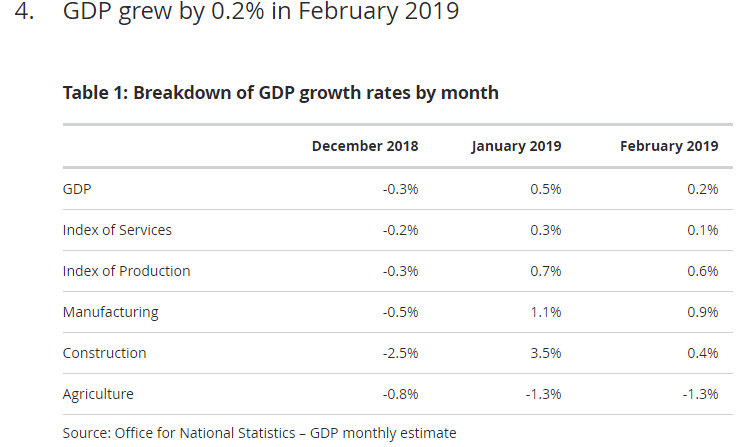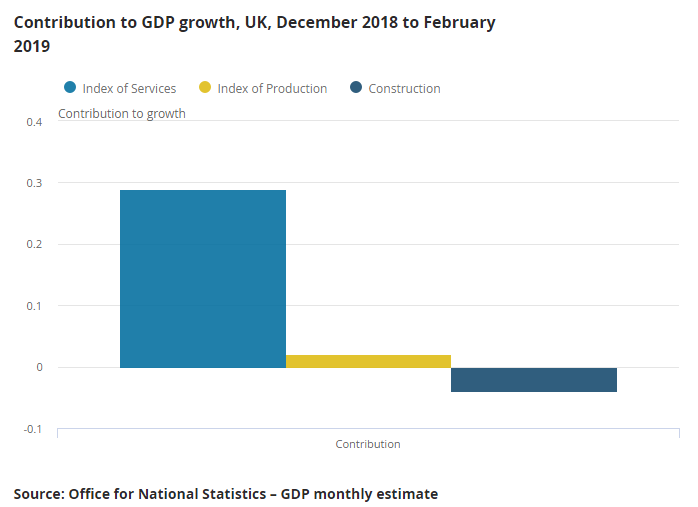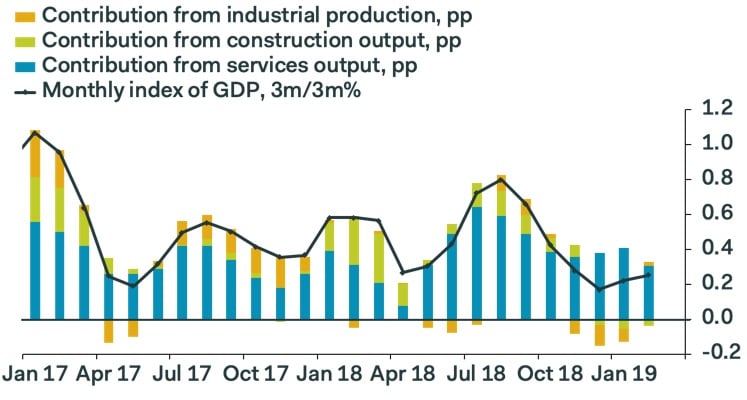UK Economy On Track for Solid First Quarter after Holding January's Explosive Gains Through February
- Written by: James Skinner

© IRStone, Adobe Stock
- UK on course for solid Q1 after GDP grows 0.7% in first two months.
- Even assuming a March contraction, Q1 likely better than Q4 2018.
- Economy copes well with Brexit uncertainty, all eyes now on the BoE.
The UK economy could be on course for its best quarter since before the Brexit referendum after explosive gains seen during January were retained through February, Office for National Statistics (ONS) data showed Wednesday.
The economy grew by 0.2% in February which, although down from 0.5% previously, was in line with market expectations. Taken together with January's result, Wednesday's number not only draws a line beneath the dire December 2018 month but also sets the economy on track for a solid first-quarter.
Economic output rose by a total of 0.7% in the first two months of the year, which is even faster than the 0.6% pace of growth seen through the whole of the third quarter of 2018 and puts the economy on course for its best quarter since the period spanning April to July 2015.
Growth in February was broad-based, with only the agricultural sector seeing a decline in output. Services output grew by 0.2% during the recent monthg while industrial production rose by 0.6%. Manufacturing and construction production were up 0.9% and 0.4% respectively.
"Once again the initial estimate of GDP was stronger than the survey evidence had suggested, providing a reassuring sign that up to February at least, the economy weathered the Brexit chaos and overseas slowdown well," says Ruth Gregory, an economist at Capital Economics.

Above: Contributions to UK GDP growth in February and prior months. Source: ONS.
The economy contracted by -0.3% in the December month alone, which is a huge slump for any one quarter on its own let alone a singular month, although growth came back with a bang in January when GDP rose by 0.5%.
January's performance should have formed a near insurmountable hurdle for the economy to clear in February, as growing further from such a lofty rate of expansion should have been statistically difficult, particularly after considering the political headwinds that could have buffeted the economy that month.
February had, after all, been characterised by high levels of political uncertainty given Prime Minister Theresa May's proposed model of withdrawal from the EU was rejected twice during the January and to all intents and purposes, the economy was at that time on course for a so-called no deal Brexit.
"Brexit chaos may have sapped the economy of its momentum in March, as that is when the Brexit uncertainty has been greatest. All told, though, the solid growth rate in the three months to February should ease immediate fears of the economy stalling or contracting in Q1 and provides support to our view that the economy is well placed to cope with whatever Brexit throws up," says Gregory.

Above: Contributions to GDP growth on a three-month-on-three-month basis. Source: ONS.
On a rolling three-month basis UK GDP growth was 0.5% in February although, crucially, that number includes the huge -0.3% contribution from December that will drop out of the rolling number come March.
Even if the economy was to have stalled last month, growth could easily come in at a post-referendum high for the first-quarter. That data is due out on May 10.
Moreover, the Office for National Statistics data released Wednesday appeared to address speculation that the economy is being temporarily boosted by stock-piling among manufacturers ahead of the UK's now-delayed exit from the European Union.
Imports rose by 5.3% in the three months to the end of February while exports grew just 0.8%, suggesting companies have increased purchases of supplies of late. However, those imports are all a subtraction in the calculation of GDP so will do little to support growth, according to Gregory at Capital Economics.
"The economy is continuing to withstand the uncertainty created by the Brexit process better than business surveys, which collectively have signalled flatlining GDP, have suggested," says Samuel Tombs, chief UK economist at Pantheon Macroeconomics. "The upside surprise from February’s data means that we are revising up our forecast for quarter-on-quarter GDP growth in Q1 to 0.4%, from 0.3% previously. This forecast allows for a likely correction in output in the industrial, construction and retail sectors in March."

Above: Pantheon Macroeconomics graph showing trend in three-month-on-three-month GDP growth.
An economic pick up in the first quarter could be enough for markets to begin taking the Bank of England (BoE) a bit more seriously when it says that it wants to raise Bank Rate in order to safeguard the inflation target against a challenge from the consumer price index. Rising and sustained economic growth encourages inflation.
The bank has said exactly that on repeated occasions in recent months but financial markets have recently begun speculating there is a chance the BoE could be forced to cut interest rates over the coming months. The overnight-index-swap-implied Bank Rate for December 19, 2019 was just 0.67% on Friday, beneath the current 0.75%.
“If the economy performs as we expect, we think upward pressure on prices will build over the next few years and we will need to raise interest rates a bit more to keep inflation low," the bank says on its website. “Our view is based on the assumption that there will be a smooth Brexit where households and businesses have time to adjust to the new relationship between the UK and the EU.”
The market’s more pessimistic view could have more to do with international factors than it does the domestic economy. All developed world central banks have in recent months all-but abandoned any plans they once had for interest rate hikes this year.
Central banks in Australia and New Zealand are even warning that they could cut interest rates this year. Against that backdrop, the market-implied Bank Rate could simply be investors calling the Bank of England's bluff as far as its interest rate guidance goes.
Time to move your money? Get 3-5% more currency than your bank would offer by using the services of foreign exchange specialists at RationalFX. A specialist broker can deliver you an exchange rate closer to the real market rate, thereby saving you substantial quantities of currency. Find out more here.
* Advertisement



